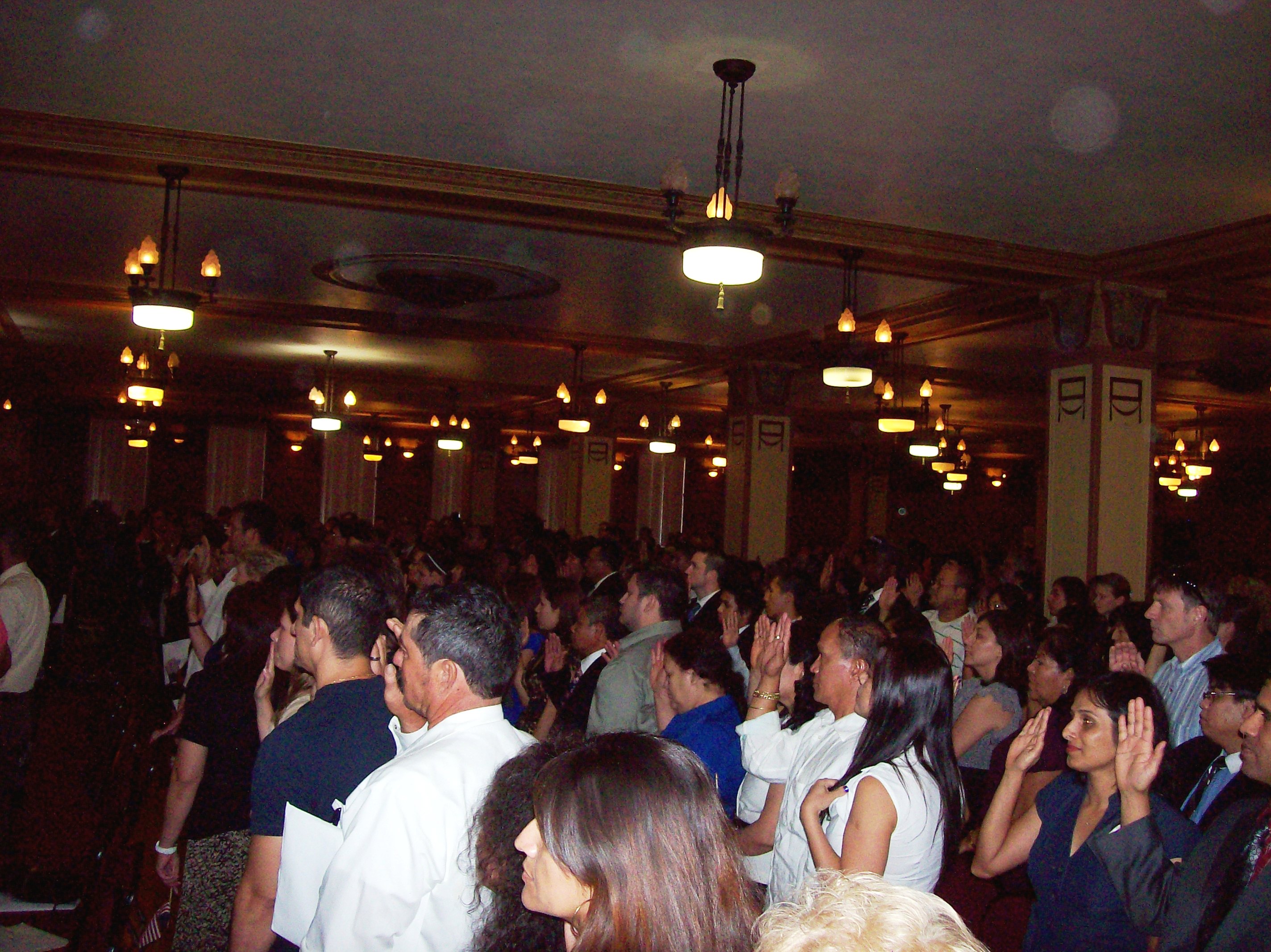
As we hurriedly walk in the scorching San Antonio, Texas, heat to the Scottish Rite Auditorium, my thoughts go back to a much cooler day about 50 years ago when I became an American citizen.
I wonder if anything has changed in either America or in those who have traveled thousands of miles, who have left loved ones in far-away lands, who sometimes even risk serious repercussions in their native lands in order to come to the "promised land "-- some simply hoping for a better life, some desperately seeking justice and freedom.
When we enter the big auditorium and see the hundreds of "U.S. naturalization candidates" neatly seated, holding small American flags, smiles on their faces, some lost in thoughts, some a little awed by the momentousness of the occasion, but all with hope and expectations in their eyes, I realize that not much has changed.
We have traveled to San Antonio to witness the U.S naturalization of a good friend, Margaret, who is from Adelaide, Australia.
Margaret immigrated to the United States in 2005 and started the "paperwork" to get her U.S. citizenship a year later. Margaret now joins 344 immigrants from 67 other countries to finally receive her U.S. citizenship. They come from Algeria and Argentina, from Bolivia and from Barbados, from Cameron and China, from Ecuador and Ethiopia; from Iran and Israel -- the names of the countries start with virtually every letter of the alphabet.
Surbhi is from India. Her husband Rahul -- a software engineer from Austin, Texas -- is proudly watching her as she awaits the big moment.
The other prospective citizens hail from big, powerful countries such as Russia, and from small, relatively unknown countries such as Sao Tome and Principe. They come from wealthy and poor countries, from democracies and from dictatorships. One young lady, from Iran, would speak later on the lack of freedom and justice in her country, especially for women.
They come from as far away as Vietnam and the Philippines and from right across our borders to the north and to the south. By far the largest contingent of new citizens comes from Mexico.
As I glance at the group once more, I notice another thing that has not changed in 50 years. Just as during my own naturalization ceremony, some of the immigrants are dressed very formally, others casually. They are young and old and everything in between -- the youngest 22, the oldest 78. They seem to represent virtually every race, ethnic background, religion and social status. They are truly a diverse, "motley crowd," soon to become part of an even bigger motley crowd: the melting pot that is America.
The ceremony finally starts.
First, the colors are presented by a sharp U.S. Air Force color guard from nearby Randolph Air Force Base. The immigrants pay their respects to the flag -- at this point, the flag of a country not their own. I can't help but to think that in a little while, when the colors are retired, they will be proudly saluting their flag, their new country's flag; a flag for which one day some of these young men and women may be asked to fight, perhaps even make the ultimate sacrifice.
But today is a day to be joyful.
As the 345 brand new Americans take the Oath of Allegiance, the expressions of happiness, pride and gratitude, accompanied by the occasional tear, again tell me that nothing has changed....
Three of the new Americans from Iran, Mexico and Bosnia-Herzegovina make nice, short speeches.
The recurring theme is about "freedom," "opportunity," and the "American Dream" -- just as I remember from 50 years ago.
But it is not all about what these immigrants expect from their new country. In their Oath of Allegiance, they solemnly swear to "renounce and abjure all allegiance and fidelity to any foreign prince, potentate, state or sovereignty... to support and defend the Constitution and laws of the United States of America against all enemies, foreign and domestic...." Their oath also includes the sobering pledge to bear arms on behalf of the United States when required by the law.
The ceremony concludes with words most of us know by heart, words that come from the hearts of these new Americans:
I pledge allegiance to the flag of the United States of America, and to the republic for which it stands, one nation under God, indivisible, with liberty, and justice for all.
As these brand new Americans join the hundreds of thousands of immigrants who are naturalized each year, I want to believe that not much has changed in America's magnanimity and tolerance since 50 years ago when she so graciously permitted me to share in the American Dream.
Photo by author
